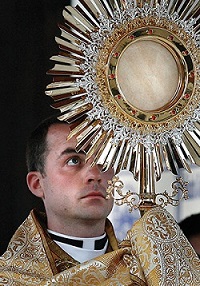
Mighty Deeds Done
Linda Sabbath grew up in a devout Jewish family. After being exposed to secular education, she decided to abandon her childhood faith and became an avowed atheist. Her intellectual giftedness won her a professorship at a university. One year, in spite of her protests, she was assigned to teach a comparative religion class. Her plan was to take her students to various religious services and afterwards explain to them the superstitious roots of such practices. They visited a Catholic Mass and stood safely in the back of the Church. When the priest raised the host at the consecration, the power of the Eucharist came upon Ms. Sabbath, and she was knocked backwards. This was the beginning of a conversion that led her to become a Catholic, and in time she became a staunch defender of the Catholic faith.
Her entire life was turned around when she experienced God’s mightiest deed—the transubstantiation of bread and wine into the living Body of Jesus Christ.
Sadly not everyone is impressed with God’s mighty deeds including the people of his day. Jesus rebuked them (Matthew 11:20-24).
“Jesus began to reproach the towns where most of his mighty deeds had been done, since they had not repented. ‘Woe to you, Chorazin! Woe to you Bethsaida! For if the mighty deeds done in your midst had been done in Tyre and Sidon they would long ago have repented in sackcloth and ashes…And as for you Capernaum, will you be exalted to the heaven? You will go down to the netherworld.”
The ministry of Jesus focused on a few northern cities—Chorazin, Bethsaida, Capernaum. He walked their streets, taught in their synagogues, and worked miraculous healings. The Son of the living God, was tangibly present among them. They listened to him and were probably impressed with his teachings. And, yes, they took advantage of the free healings that he offered them. But, for them, Jesus was like the seed planted on the roadside. They quickly forgot him and returned to their “real life” of eating and drinking, buying and selling, marrying and reveling. There was no evidence of repentance among them. They were not willing to abandon their self-centered lives.
Jesus continued:
“But I tell you it will be more tolerable for the land of Sodom on the day of judgement than for you.”
Whoa! There was no land so steeped in sin as was Sodom, and yet, Capernaum was worse odd. Sodom had the presence of Lot; Capernaum had the presence of God’s own son.
We wonder what Jesus is speaking to our age? As Catholics we’ve had the presence of Jesus in the Blessed Sacrament made available daily throughout our cities. We have the presence of Mary, the rich teachings of the Church, and the company of the great saints who’ve gone before us. God has spoiled us! Is there any more he could have done to draw us to himself.
Are we so awed by what God has done for us, that we repent dramatically even to the point of fasting and doing penance? Are we as moved by the presence of Jesus as were such converts as Linda Sabbath?
Jesus spoke words of “woe” to these cities, not to put them on a guilt trip, but to give them one last chance to repent. We ask ourselves whether or not we are using the deprivations of our time as an opportunity to turn to Jesus with all our hearts, go to confession, and make him clearly number one in our lives.
“Behold the bridegroom is coming” (Matthew 25:6).
